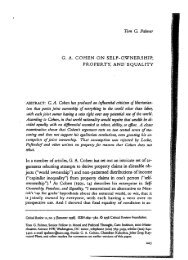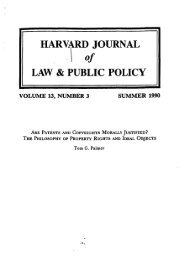it's safe streets versus urban terror; in the '50s ... - Tom G. Palmer
it's safe streets versus urban terror; in the '50s ... - Tom G. Palmer
it's safe streets versus urban terror; in the '50s ... - Tom G. Palmer
Create successful ePaper yourself
Turn your PDF publications into a flip-book with our unique Google optimized e-Paper software.
IT'S SAFE STREETS VERSUS URBAN TERROR;IN THE '50S, RAMPANT<br />
CRIME DIDN'T EXIST BECAUSE OFFENDERS FEARED WHAT THE<br />
POLICE WOULD DO.<br />
March 10, 1991<br />
Los Angeles Times, Sunday edition<br />
By LLEWELLYN H. ROCKWELL<br />
If you offer a small boy one candy bar now or 10 tomorrow, he'll grab <strong>the</strong><br />
one. That's because children have what economists call a "high time<br />
preference." They want it, and <strong>the</strong>y want it now. The future is a haze.<br />
The punish<strong>in</strong>g of children must take this <strong>in</strong>to account. One good whack<br />
on <strong>the</strong> bottom can have an effect. A threat about no TV all next year will<br />
not.<br />
As we grow older, this changes. We care more, and th<strong>in</strong>k more, about <strong>the</strong><br />
future. In fact, this is <strong>the</strong> very process of maturation. We plan, save, <strong>in</strong>vest<br />
and put off today's gratification until tomorrow.<br />
But street crim<strong>in</strong>als, as economist Murray N. Rothbard po<strong>in</strong>ts out, have<br />
<strong>the</strong> time preference of depraved <strong>in</strong>fants. The prospect of a jail sentence 12<br />
months from now has virtually no effect.<br />
As recently as <strong>the</strong> 1950s -- when street crime was not rampant <strong>in</strong> America<br />
-- <strong>the</strong> police always operated on this pr<strong>in</strong>ciple: No matter <strong>the</strong> vagaries of<br />
<strong>the</strong> court system, a mugger or rapist knew he faced a trounc<strong>in</strong>g --<br />
proportionate to <strong>the</strong> offense and <strong>the</strong> offender -- <strong>in</strong> <strong>the</strong> back of <strong>the</strong> paddy<br />
wagon, and maybe even a repeat performance at <strong>the</strong> station house. As a<br />
result, crim<strong>in</strong>als were terrified of <strong>the</strong> cops, and our <strong>streets</strong> were <strong>safe</strong>.<br />
Today's crim<strong>in</strong>als know that <strong>the</strong>y probably won't be convicted, and that if<br />
<strong>the</strong> are, <strong>the</strong>y face a short sentence -- someday. The result is city <strong>terror</strong>ism,<br />
though we are seldom shown videos of old people be<strong>in</strong>g mugged, women<br />
be<strong>in</strong>g raped, gangs shoot<strong>in</strong>g drivers at random or store clerks hav<strong>in</strong>g <strong>the</strong>ir<br />
throats slit.
What we do see, over and over aga<strong>in</strong>, is <strong>the</strong> tape of some Los Angeles-area<br />
cops giv<strong>in</strong>g <strong>the</strong> what-for to an ex-con. It is not a pleasant sight, of course;<br />
nei<strong>the</strong>r is cancer surgery.<br />
Did <strong>the</strong>y hit him too many times Sure, but that's not <strong>the</strong> issue: It's <strong>safe</strong><br />
<strong>streets</strong> <strong>versus</strong> <strong>urban</strong> <strong>terror</strong>, and why we have moved from one to <strong>the</strong> o<strong>the</strong>r.<br />
Liberals talk about bann<strong>in</strong>g guns. As a libertarian, I can't agree. I am,<br />
however, beg<strong>in</strong>n<strong>in</strong>g to wonder about video cameras.<br />
Llewellyn H. Rockwell Jr. is president of <strong>the</strong> Ludwig von Mises Institute,<br />
an economics th<strong>in</strong>k tank <strong>in</strong> Auburn, Ala.











